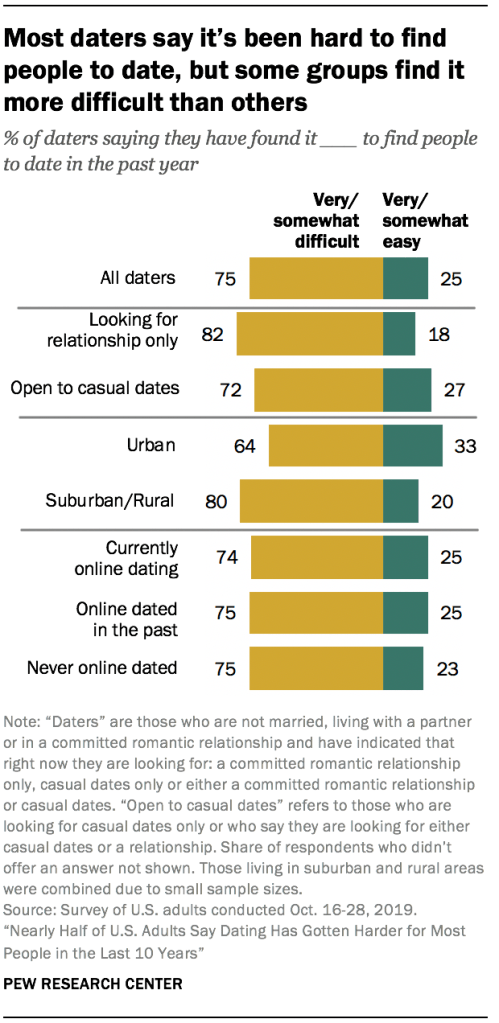
Most people who are on the dating market say their dating life is not going well and that it’s been hard to find people to date. They give a variety of possible explanations for this difficulty, but men and women report different reasons. Many men say it’s difficult for them to approach people, while majorities of women say it’s hard to find someone looking for the same type of relationship as them and who meets their expectations.
Many Americans, whether they are currently on the dating market or not, report having had negative dating experiences. A majority of women (as well as 35% of men) say they’ve experienced some kind of harassing behavior from someone they were dating or on a date with, ranging from receiving an unwanted sexually explicit image to being pressured for sex or having someone share a sexually explicit image of them without their consent. And about three-in-ten (and a higher share of young adults) say they have had someone they’ve gone out with suddenly stop answering their phone calls or messages without explanation.
Single-and-looking adults are overall open to dating people with a variety of different traits, including people who make significantly more or less money than them and people who are a different race or religion. But there is less agreement when it comes to dating someone who lives far away, has a lot of debt, or voted for Donald Trump.
Most daters don’t feel like their dating life is going well and say it’s been difficult to find people to date
Two-thirds of those who are single and looking for a relationship or dates say their dating life is either going not too well or not at all well (67%), while 33% say it’s going very or fairly well. Majorities of daters across divides by gender, age, race and ethnicity, education, sexual orientation and marital history say their dating life is not going well.
People who are looking only for a relationship (78%) are more likely than those who are open to casual dates (63%) to say their dating life is not going well. On the flip side, people who are single and looking for a relationship or dates but are currently casually dating someone are generally satisfied with their dating life. About seven-in-ten of this group (69%) say their dating life is going very or fairly well, compared with just 21% of daters who are not casually dating anyone.
Most daters (75%) say it’s been very or somewhat difficult in the last year to find people to date. A quarter say it’s been very or somewhat easy, with only 5% saying it has been very easy. Again, there are few differences across demographic groups.
Those who live in suburban or rural areas report finding people to date somewhat harder than those who live in urban areas. Eight-in-ten of those in suburban and rural areas say this has been very or somewhat difficult, compared with 64% of those in urban areas.
Those who are looking only for a relationship are more likely than those who are open to casual dates to say it has been difficult to find people to date (82% vs. 72%).
Daters who have had difficulty finding people to date give a variety of reasons
Among these daters who report that they have had difficulty in the past year finding someone to date, no one explanation for their difficulty stands out as most important. The challenges of finding someone looking for the same type of relationship (53%), finding it hard to approach people (46%) and finding someone who meets one’s expectations (43%) top the list as major reasons why it has been difficult to find people to date. However, substantial shares also say the limited number of people in their area to date (37%), being too busy (34%) and people not being interested in dating them (30%) are major reasons.
This belies the fact that there are large gender gaps on some of these items. Women who have found it difficult to date are much more likely than men to say a major reason for their difficulty is that it’s hard to find someone who meets their expectations (56% vs. 35%) and that it’s hard to find someone looking for the same kind of relationship as them (65% vs. 45%).
For their part, men are more likely to say difficulty in approaching people (52% of men vs. 35% of women) and being too busy (38% vs. 29%) are major reasons it has been difficult to find people to date.
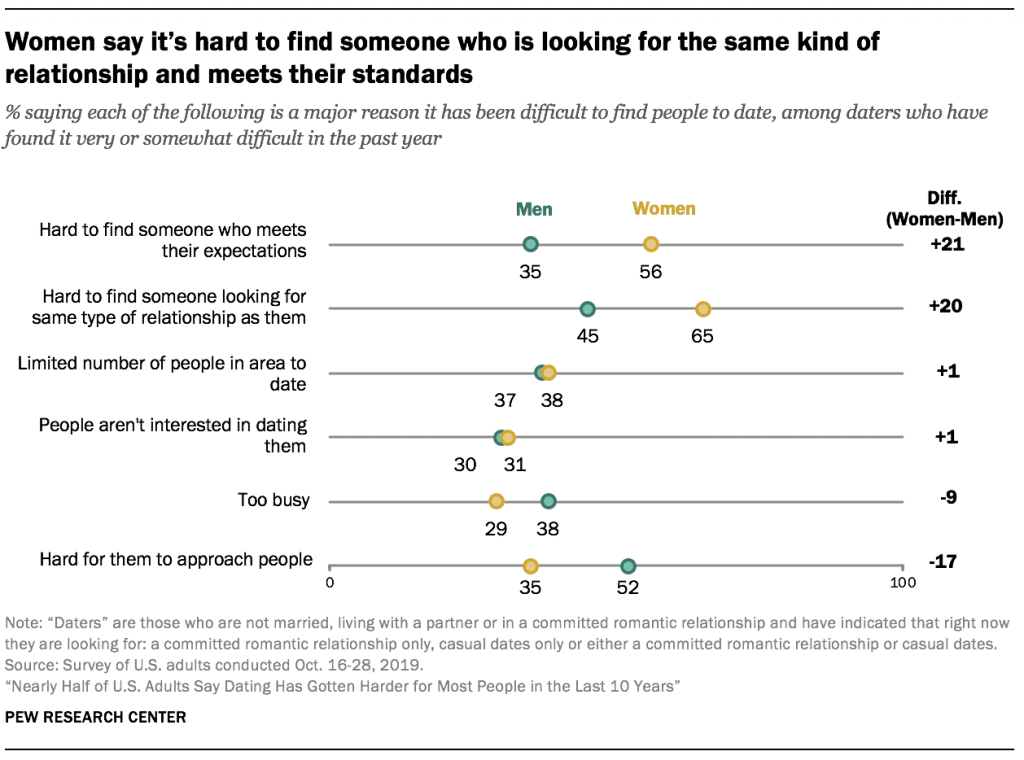
Some of these reasons are equally common among different age groups. For example, 53% of both those younger than 40 and those 40 and older say a major reason they’ve had difficulty is that it’s hard to find someone looking for the same kind of relationship. Other reasons are much more common among younger singles who have had difficulty finding people to date lately. Those younger than 40 are much more likely to say it’s hard to approach people (65% say this is a major reason they’ve had difficulty, compared with 27% of those 40 and older). Younger daters are also more likely than their older counterparts to say being too busy (43% vs. 26%) and that people aren’t interested in dating them (38% vs. 23%) are major reasons they have found it difficult to find people to date.
College graduates are more likely than those who do not have a bachelor’s degree (54% vs. 39%) to say a major reason they have had difficulty finding people to date is that it’s hard to find someone who meets their expectations.
A majority of online dating users report positive experiences
Of the 30% of U.S. adults who have ever used an online dating site or app, a majority (57%) say their experiences with online dating were very or somewhat positive. Men and women are about equally likely to have had positive experiences online dating. Most online dating users also say they found it easy to find people who they were physically attracted to, shared their hobbies and interests, seemed like someone they wanted to meet in person, and were looking for the same kind of relationship.
Despite these positive experiences, daters who are currently online dating or have online dated in the past are no more likely than those who have never online dated to say their dating life is going well.
For more about Americans’ personal experiences with online dating, see “The Virtues and Downsides of Online Dating.”
Long-distance relationships, debt and voting for Donald Trump top list of relationship deal breakers
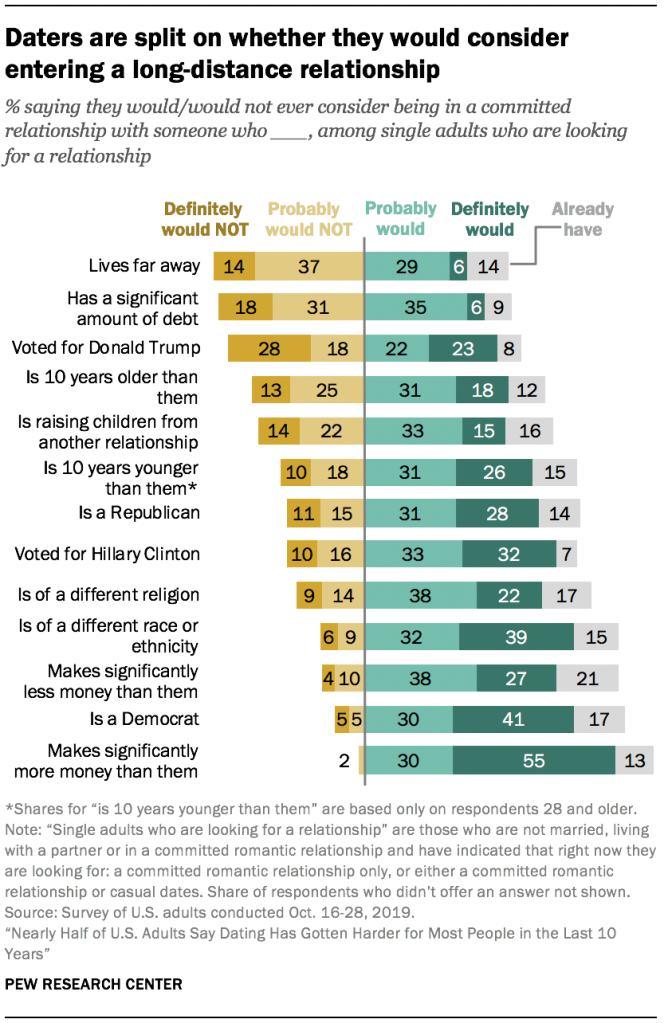
Overall, singles who are looking for a relationship are open to dating people with many different traits and from a variety of backgrounds. Some traits give people pause more than others, though.5
These daters are split when it comes to whether they would consider being in a relationship with someone who lives far away (51% say they probably or definitely would not), has a significant amount of debt (49%) or voted for Donald Trump (47%). Being in a relationship with someone who is 10 years older than them (38% say they wouldn’t consider it) or raising children from another relationship (36%) would also give some daters pause.
For more about who would and wouldn’t consider a relationship with a partisan or Trump or Clinton voter, see “Most Democrats who are looking for a relationship would not consider dating a Trump voter.”
About a quarter or fewer of daters who are looking for a relationship say they definitely or probably wouldn’t consider being in a relationship with someone who is 10 years younger than them (27%), is a Republican (27%), voted for Hillary Clinton (26%), is of a different religion (23%), is of a different race or ethnicity (15%), makes significantly less money than them (14%) or is a Democrat (11%).6 Hardly anyone says they wouldn’t be in a relationship with someone who makes significantly more money than them (3%).
Single women who are looking for a relationship are much more likely than their male counterparts to say they would not consider entering a relationship with someone who is 10 years younger than them (42% of women say they wouldn’t, compared with just 16% of men). And the inverse is true when it comes to dating someone 10 years older: 47% of men say they wouldn’t consider being in a relationship with someone 10 years older, while 27% of women say the same.
While both men and women who are seeking a relationship are generally open to dating someone who makes either less or more money than them, women are roughly three times as likely as men to say they wouldn’t consider being in a relationship with someone who makes significantly less money than them (24% vs. 7%). Very small shares of both men and women say they wouldn’t be in a relationship with someone who makes significantly more money than them (3% and 2%, respectively).
There are also some significant differences between younger and older people who are looking for a relationship. About six-in-ten of those ages 40 and older (59%) say they probably or definitely would not consider being in a relationship with someone who has significant debt, compared with 41% of adults younger than 40. Meanwhile, those younger than 40 are more resistant to the idea of seriously dating someone with children from another relationship (42% say they wouldn’t consider it, compared with 28% of those 40 and older). Daters who are ages 28 to 39 are more likely to say they wouldn’t consider being in a relationship with someone 10 years younger than them (39% vs. 21% of those 40 and older). Younger and older daters are equally likely to be willing to seriously date someone 10 years older than them.
Republicans are more likely than Democrats to say they probably or definitely wouldn’t consider being in a committed relationship with someone of a different race or ethnicity (21% vs. 12%).
Democrats are much more likely to say they would not consider a relationship with someone who voted for Trump (71%) compared with the share of Republicans who would not consider seriously dating someone who voted for Clinton (47%).
It is also worth noting that the overall share of daters looking for a relationship who say they definitely would not consider being in a relationship with someone who voted for Trump (28%) is at least 10 percentage points higher than any of the other characteristics asked about in this question.
Most single people aren’t feeling too much pressure to find a partner
The majority of single adults don’t feel a great deal of pressure to be in a committed relationship. Some 37% say they feel a lot or some pressure from society to find a partner and 31% say they feel pressure from their family.7 Just 22% say the same about pressure coming from their friends. Very small shares say they feel a lot of pressure from each of these sources.
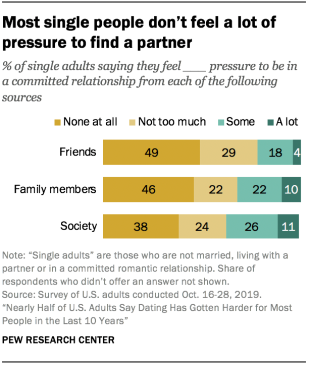
Though single people overall don’t feel a lot of pressure to be partnered, the picture is different when looking only at young singles. Among those ages 18 to 29, 53% say they feel that society puts a lot of or some pressure on them to be in a relationship. Smaller shares of older singles say the same, including just 21% of those 65 and older – the vast majority of whom are widowed or divorced (by contrast, the vast majority of 18- to 29-year-old singles have never been married).
Young singles are also far more likely than their older counterparts to say they face pressure from their family members to be part of a couple: 47% of 18- to 29-year-olds say there is a lot or some pressure, compared with 34% of those ages 30 to 49, 25% of those 50 to 64 and 20% of those 65 and older.
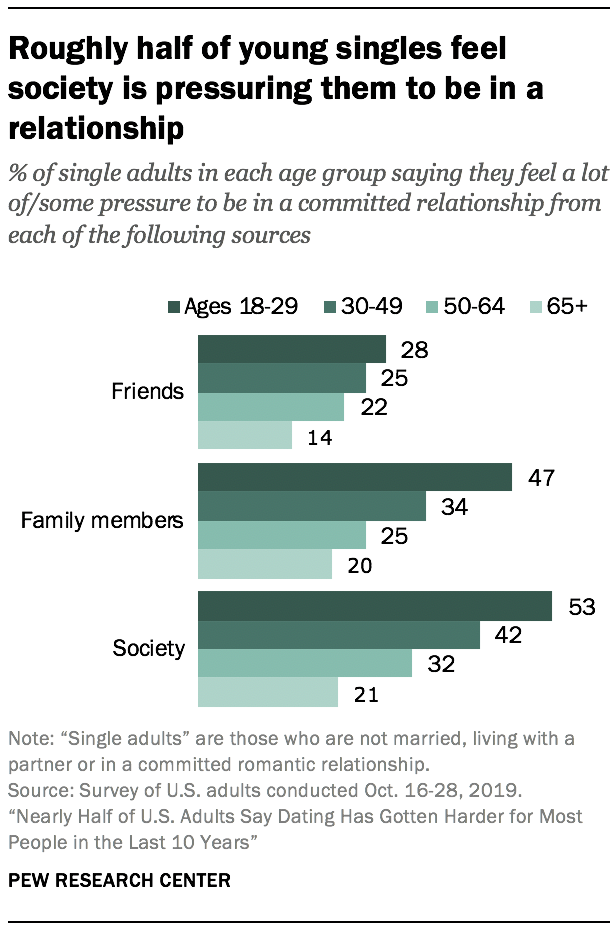
Young singles feel less pressure to find a partner from their friends than from other sources, but 18- to 29-year-olds are still twice as likely than those 65 and older to say there is at least some pressure from their friends (28% vs. 14%).
Over half of singles 65 and older say they feel no pressure at all from each of these sources.
Single men and women are roughly equally likely to say they face a lot of or some pressure to find a partner from society and their friends. But men are more likely to say they feel pressure from family members (38% say they feel a lot of or some pressure, compared with 26% of women).
Meanwhile, women are more likely than men to say they feel no pressure at all from each of these sources, by margins of 12 percentage points or more.
The pressures single people feel from family, friends or society don’t seem to be motivating them to find a partner. Those who feel pressure are no more likely than those who don’t to say they are looking for a relationship or dates, or that they are currently online dating, even after taking demographic differences into account.
Women bear the brunt of harassing behaviors from people they’re dating
Consistent with past research that women are much more likely than men to say they have experienced sexual harassment in the workplace and elsewhere, including online and on online dating sites and apps, women also report being harassed by people they were dating or had been on a date with at much higher rates than men.
Women are much more likely than men to say someone they have dated or been on a date with has pressured them for sex (42% vs. 19%) or touched them in a way that made them feel uncomfortable (35% vs. 9%). The gender gap is smaller, but women are still more likely than men to report that someone they have dated sent them sexually explicit images they didn’t ask for (25% vs. 19%) or spread rumors about their sexual history (16% vs. 11%). Relatively small shares of both men and women report that someone they’ve dated has shared a sexually explicit image of them without their consent or publicly shared their contact information or address without permission (sometimes called “doxing”).
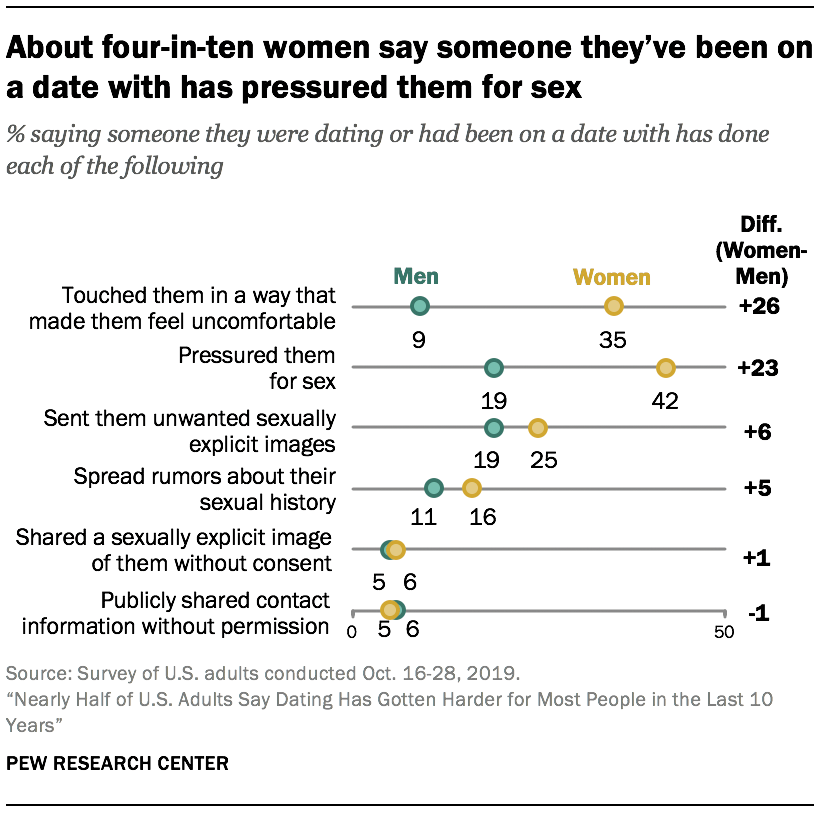
Adults younger than age 40 are more likely than older adults to say that someone they have dated has pressured them for sex (38% vs. 26%), sent them unwanted explicit images (34% vs. 14%), spread rumors about their sexual history (20% vs. 10%), publicly shared their contact information (9% vs. 4%) or shared an explicit image of them without their consent (10% vs. 3%). There is no age difference in whether someone reports that a date has touched them in a way that made them uncomfortable.
When it comes to receiving unwanted sexual images and someone spreading rumors about their sexual history, the gender gap is only present among those younger than 40. Some 42% of younger women say someone they’ve dated has sent them explicit images they didn’t ask for, compared with 26% of younger men, while 14% of both men and women who are 40 and older say the same. Women younger than 40 are also more likely than men younger than 40 to say someone they have dated has spread rumors about their sexual history (23% vs. 16%), while roughly equal shares of women and men 40 and older say the same (11% and 8%, respectively). Previously released findings from the survey show that young women are also more commonly the target of harassing behavior on online dating sites and apps.
Black (31%) and Hispanic (28%) adults are more likely than White adults (18%) to say they have received unwanted explicit images from someone they were dating or had been on a date with. Black adults (10%) are also more likely to say someone has publicly shared their contact information without their permission, compared with White (4%) and Hispanic (5%) adults.
Adults who identify as lesbian, gay or bisexual are more likely than their straight counterparts to say they have experienced each of these harassing behaviors. LGB online daters also report higher rates of harassment on online dating sites and apps.
Younger people more likely to have looked up someone they were romantically interested in online
Not only have many Americans used the internet to seek out relationships or dates, they are using the internet to gather information as well. Roughly four-in-ten adults (38%), whether they are currently single or not, say they have searched for information online about someone they were interested in romantically.
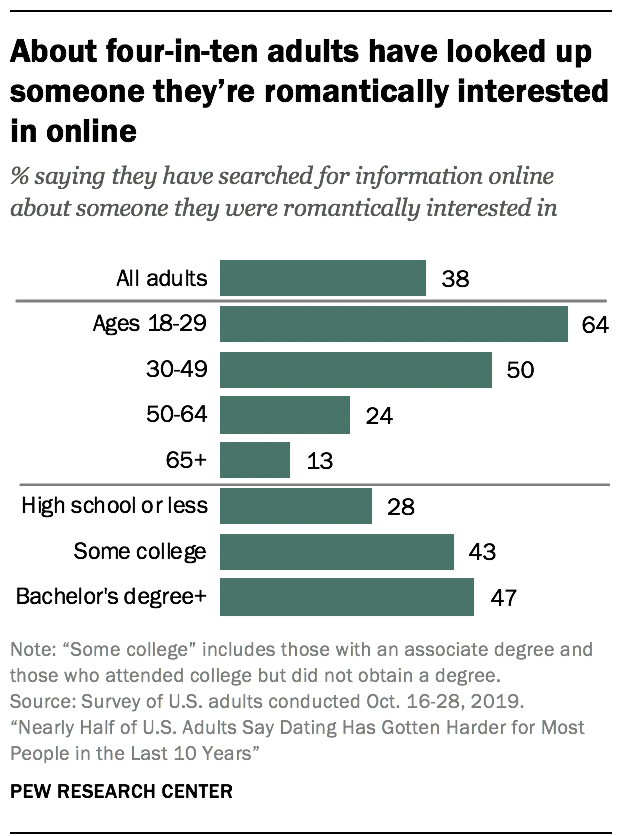
Most young adults ages 18 to 29 (64%) say they have done this, compared with 50% of 30- to 49-year-olds, 24% of 50- to 64-year-olds and only 13% of those 65 and older.
Those with a bachelor’s degree or more are more likely than those with less education to say they have ever searched for information on a potential romantic partner online (47% vs. 35%). These age and education findings hold even when accounting for the fact that younger and more educated adults are more likely to use the internet.
Roughly seven-in-ten of those who have used an online dating site or app (71%) say they have searched for information online on someone they were interested in.
About three-in-ten adults say they have been ‘ghosted’
The majority of adults (62%) say they have heard the term “ghosting” before – that is, ending a relationship or casual dating situation by suddenly not responding to calls or messages with no explanation. About three-in-ten (29%) say they have actually experienced this.
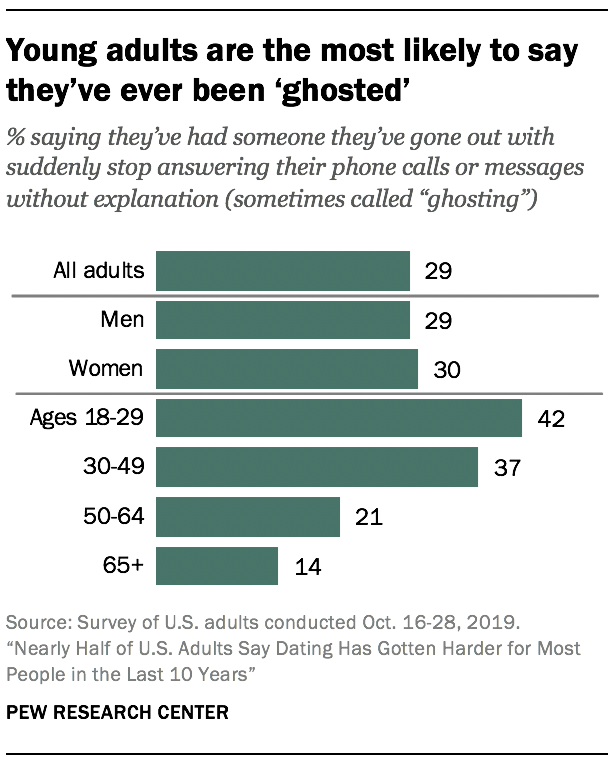
Young adults, as well as those who are currently on the dating market (regardless of their ages), are among the most likely to have been ghosted. About four-in-ten (42%) 18- to 29-year-olds (42%), regardless of their current relationship status, say they have experienced this. Some 37% of 30- to 49-year-olds (37%) also say they’ve been ghosted, compared with 21% of 50- to 64-year-olds and 14% of those 65 and older.
People with online dating experience (53%) are more likely to report that they’ve been ghosted than those without any experience dating online (19%). Those who are currently online dating are particularly likely to say this (62%).
Men and women are equally likely to say they have experienced ghosting before (29% and 30%, respectively).
CORRECTION (Aug. 21, 2020): The headline of the chart “About four-in-ten women say someone they’ve been on a date with has pressured them for sex” was updated to reflect the numbers in the chart. There were no changes to the findings, and the changes did not affect the report’s substantive findings.




